新编英语教程6 课文翻译
李观仪新编英语教程第六册翻译

1 由于缺少资金,整个计划失败了The whole plan fell through for want of fund.2 牛顿被公认为是世界最杰出的科学家之一。
Newton is actnowledged as one of the world;s most eminent scientists.3 他对生产成本的估算总是准确无误He calcuates the cost of production with invariable accuracy4 公司发言人的不负责任的讲话受到了严厉的指责The spokesman of the corporation was berated for his irresponsible words.5 这名商业银行的年轻职员看出那张十英镑的假币The young clerk from the commercial bank soitted thecorinterfeit ten-pound note.6 这个精干的经理立刻行动起来The efficient manager acted promptly7 请把候补名单上她的名字换成你的名字Pleasure replace her name for yours on the waiting list8 她觉得她在当地综合医院任实习医师是一段宝贵的经历Shen found that her internship in the local general hospital was a rewarding experience9 不要感叹过去得不幸,振作起来行前看Don't lament your past misfortunes., keep your shin up and look to the future 1 富兰克林在他的自传里力劝读者要勤俭Franklin exhorted readers to be diligent and thrifty in his Autobiography.2.谁能证实这签名无讹Who can attest to the genuineness of the signature?3. 人们给它起了小家伙的绰号。
新编英语教程6 dictionary work (2到10)中英对照
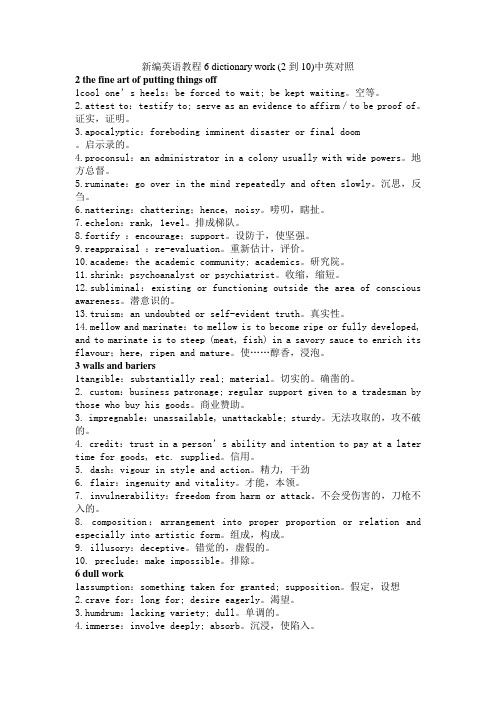
新编英语教程6 dictionary work (2到10)中英对照2 the fine art of putting things off1cool one’s heels:be forced to wait; be kept waiting。
空等。
2.attest to:testify to; serve as an evidence to affirm/to be proof of。
证实,证明。
3.apocalyptic:foreboding imminent disaster or final doom。
启示录的。
4.proconsul:an administrator in a colony usually with wide powers。
地方总督。
5.ruminate:go over in the mind repeatedly and often slowly。
沉思,反刍。
6.nattering:chattering;hence, noisy。
唠叨,瞎扯。
7.echelon:rank, 1evel。
排成梯队。
8.fortify :encourage;support。
设防于,使坚强。
9.reappraisal :re-evaluation。
重新估计,评价。
10.academe:the academic community; academics。
研究院。
11.shrink:psychoanalyst or psychiatrist。
收缩,缩短。
12.subliminal:existing or functioning outside the area of conscious awareness。
潜意识的。
13.truism:an undoubted or self-evident truth。
真实性。
14.mellow and marinate:to mellow is to become ripe or fully developed, and to marinate is to steep (meat, fish) in a savory sauce to enrich its flavour;here, ripen and mature。
新编英语教程6-Unit One
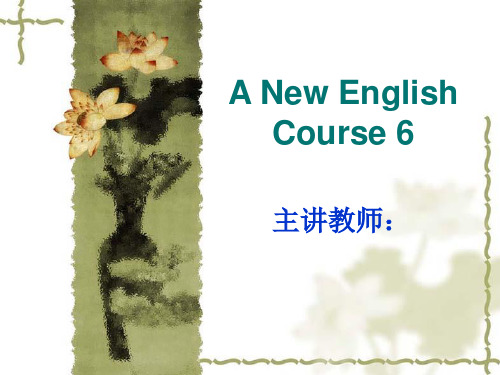
c.f.: change for the worse: make worse something that already exists or that has gone before 向着较坏的情况转变,更不好
他买了一辆新汽车,但结果比原来的还不好。
E.g.: He bought a new car but it turned out to be for the worse.
I. Library Work
and
numerous other music institutions. Main museums and art galleries of Manhattan include the Metropolitan Museum of Art, and American Museum of Natural History, etc. Columbia University and New York University are also located here. Among other points of
At
the end of the trip and back home, the father asked the son:“What did you think of the trip?”
The son replied:“Very nice, Dad.” Father: Did you notice how poor they were? Son: Yes. Father: What did you learn? Son: I learned that we have one dog in the house and they have four.
最新新编英语教程6-U7-Beauty-中英翻译

BeautySusan SontagFor the Greeks, beauty was a virtue: a kind of excellence. Persons then were assumed to be what we now have to call lamely, enviously whole persons. If it did occur to the Greeks to distinguish between a person’s “inside” and “outside”, they still expected that inner beauty would be matched by beauty of the other kind. The well-born young Athenians who gathered around Socrates found it quite paradoxical that their hero was so intelligent, so brave, so honorable, so seductive and so ugly. One of Socrates main pedagogical acts was to be ugly and teach those innocent, no doubt splendid-looking disciples of his how full of paradoxes life really was.They may hav e resisted Socrates’ lessons. We do not. Several thousand years later, we are more wary of the enchantments of beauty. We not only split off with the greatest facility-the “inside” (character, intellect) from the “outside” (looks): but we are actually surp rised when someone who is beautiful is also intelligent, talent and good.It was principally the influence of Christianity that deprived beauty of the central place it had in classical ideals of human excellence (virtus in latin) to moral virtue only, Christianity set beauty adrift-as an alienated, arbitrary, superficial enchantment. And beauty has continued to lose prestige. For close to two centuries it has become a convention to attribute beauty to only one of the two sexes: the sex which, however Fair, is always Second. Associating beauty with women has put beauty even further on the defensive, morally.A beautiful woman, we say in English. But a handsome man. “Handsome” is the masculine equivalentof-and refusal of-a compliment which has accumulate certain demeaning overtones, by being resolved women only. That one can call a man in French and in Italian suggests that catholic countries, unlike those countries shaped by the Protestant version of Christianity, still retain some vestiges of the pagan admiration for beauty. But the differences, if one exists, is of degrees only. In every modern country that is Christian or post-Christian, women are the beautiful sex to the detriment of the notion of beauty as well as of women.To be called beautiful is th ought to name something essential to women’s character and concerns. (In contrast to men whose essence is to be strong or competent). It doesn’t take someone in the throes of advanced feminist awareness to perceive that the way women are taught to be involved with beauty encourages narcissism, reinforces dependence and immaturity. Everybody (women and men) knows that. For it is ”every body”, a whole society, that has identified with caring about what one is and does and only secondarily, if at all, about how one looks.) Given these stereotype, it is on wonder that beauty enjoys, at best, a rather mixed reputation.It is not, of course, the desire to be beautiful that is wrong but the obligation to be or to try. What is accepted by most women as a flattering idealization of their sex is a way of making women feel inferior to what they actually are, or normally grow to be. For the ideal of beauty is administered as a form ofself-oppression. Women are taught to see their bodies in parts, and to evaluate each part separately. Breasts, feet, hips, waistline neck, eyes, nose, complexion, hair, and so on, each in turn is submitted to an anxious, fretful, often despairing scrutiny. Even if some pass muster, some will always be found wanting. Nothing less than perfection will do.In men, good looks is a whole, something taken in at a glance. It does not need to be confirmed y givingmeasurements of different regions of the body, nobody encourages a man to dissect his appearance, feature by feature. As for perfection, that is considered trivial-almost unmanly. Indeed, in the ideally good-looking man a small imperfection or blemish is considered positively desirable. According to one movie critic (a woman) who is a declared Robert Redford fan, it is having that cluster of skin-colored moles on one cheek that saves Redford from being merely a “pretty face.” Think of the depreciation of women, as well as of beauty, that id implied in that judgment.“The privileges of beauty are immense.” said Cocteau. To be sure, beauty i s a form of power. And deservedly so. What is lamentable is that it is the only form of power that most women are encouraged to seek. This power is always conceived relation to men; it is not the power to do that but the power to attract. It is a power that negates itself. For this power is not one that can be chosen freely, at least, not by women, or renounced without social censure.To preen, for a woman, can never be jut a pleasure. It is also a duty. It is her work. If a woman dose real work, and even if she has clambered up to a leading position in politics, law, medicine, business, or whatever, she is always under pressure to a confess that she still works at bring attractive. But in so far as she is keeping up as one of the Fair Sex, she brings under suspicion her very capacity to be objective, professional, authoritative, thoughtful. Damned if they do-women are. And damned if they don’t.One could hardly ask for more important evidence of the dangers of considering persons as split between what is “inside” and what is “outside” than that interminable half-comic half-tragic tale, the oppression of women. How easy it is to start off by defining women as caretakers of their surfaces, and then to disparage them (or find them adorable) for being “superficial”. It is a crude trap, and it has worked for too long. But to get out of the trap requires that women get some critical distance from the excellence and privilege which is beauty, enough distance to see how much beauty itself has been abridged in order to prop up the mythology of the “feminine”. There should be a way of saving beauty from women, and for them.对于古希腊人来说,美丽是一种美德:一种出色表现。
全新版大学英语综合教程 6课文翻译
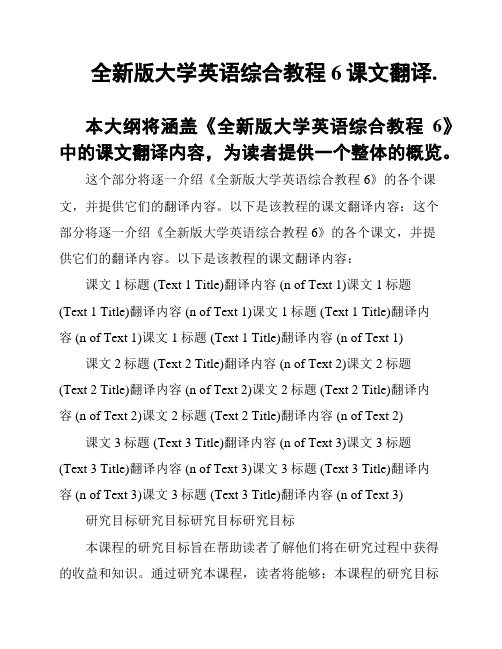
全新版大学英语综合教程 6课文翻译.本大纲将涵盖《全新版大学英语综合教程6》中的课文翻译内容,为读者提供一个整体的概览。
这个部分将逐一介绍《全新版大学英语综合教程 6》的各个课文,并提供它们的翻译内容。
以下是该教程的课文翻译内容:这个部分将逐一介绍《全新版大学英语综合教程 6》的各个课文,并提供它们的翻译内容。
以下是该教程的课文翻译内容:课文1标题 (Text 1 Title)翻译内容 (n of Text 1)课文1标题(Text 1 Title)翻译内容 (n of Text 1)课文1标题 (Text 1 Title)翻译内容 (n of Text 1)课文1标题 (Text 1 Title)翻译内容 (n of Text 1) 课文2标题 (Text 2 Title)翻译内容 (n of Text 2)课文2标题(Text 2 Title)翻译内容 (n of Text 2)课文2标题 (Text 2 Title)翻译内容 (n of Text 2)课文2标题 (Text 2 Title)翻译内容 (n of Text 2) 课文3标题 (Text 3 Title)翻译内容 (n of Text 3)课文3标题(Text 3 Title)翻译内容 (n of Text 3)课文3标题 (Text 3 Title)翻译内容 (n of Text 3)课文3标题 (Text 3 Title)翻译内容 (n of Text 3) 研究目标研究目标研究目标研究目标本课程的研究目标旨在帮助读者了解他们将在研究过程中获得的收益和知识。
通过研究本课程,读者将能够:本课程的研究目标旨在帮助读者了解他们将在研究过程中获得的收益和知识。
通过研究本课程,读者将能够:提升英语综合能力,包括听、说、读、写和翻译。
培养跨文化交际的能力,拓宽国际视野。
掌握批判性思维和问题解决的能力,拓展认知能力。
研究和运用相关词汇、语法、句型和语用表达,提升语言运用能力。
新编英语教程6课文翻译

第1单元避免两词铭记两词在生活中,没有什么比顿悟更令人激动,更有益处了,它可以改变一个人,不仅仅是改变,而且变得更好,当然这种顿悟的时刻很罕见,但仍然会降临到我们所有人身上,它有时来自于一本书,一次不到一句诗歌,有时来自于一个朋友,在曼哈顿一个寒冷的冬季下午,我坐在一个法国小餐馆儿里,倍感失落和压抑,因为我的几次错误估算,一个对我人生至关重要的项目落空了,就连马上要见到一个老朋友(这个老人,我常私下亲切的这样想到他)的念头,都不像以前那样让我兴奋,我坐在桌边,皱起眉头看着色彩多样的桌布,反复咀嚼着自己的失误。
他来了,穿过街道,裹着旧大衣,不成形的毡帽低低的压在光头上,看上去不像是一个有名的精神病医生,倒像是一个精力充沛的小土地神,他的几个办公室就在附近,我知道他看完今天的最后一个病人,他年近80,但仍然拎着装满文件的公文包,工作起来像一个大机构的主管,只要有空,他仍然爱溜去打高尔夫球。
他敏锐的观察力早已不让我感到惊奇,于是我就详细的把烦恼告诉了他,带着一丝忧伤的自豪,我尽量的陈述实情,对自己的失意,我只能怪自己,不怪任何人,我分析了整件事情,所有的错误判断,以及不明智的行动,我讲了约有15分钟,老人默默的喝着啤酒。
老人从纸盒里拿出一盒磁带,放进录音机,然后说,磁带上有到我这里来求助的三个人的简短录音,当然我不告诉你是谁,我想让你听听,看你是否能找出,一个两字短语,是三个案例所共有的。
他笑道,别这么困惑,我有我的理由。
在我看来,磁带上三个人所共有的不是愉快的事,首先讲话的是个男人,他显然做生意遭受了一些损失,或经历了失败,他怪自己工作不够努力,没有远见,第二个说话的是个女人,他一直未婚,因为他要对自己的寡母尽孝心,他痛苦的回忆了被自己放弃的所有嫁人的机会,第三个说话的是位母亲,她十多岁的儿子被警察抓了,她不停的责备自己。
老人关掉录音机,靠在椅子上:“这些录音中有一个充满微妙毒性的短语,反复出现了六次,你听出来了吗?没有,噢,这可能是因为几分钟前在餐馆里,你自己说了三次。
(NEW)李观仪《新编英语教程(6)》(第3版)学习指南【词汇短语+课文精解+全文翻译+练习答案】
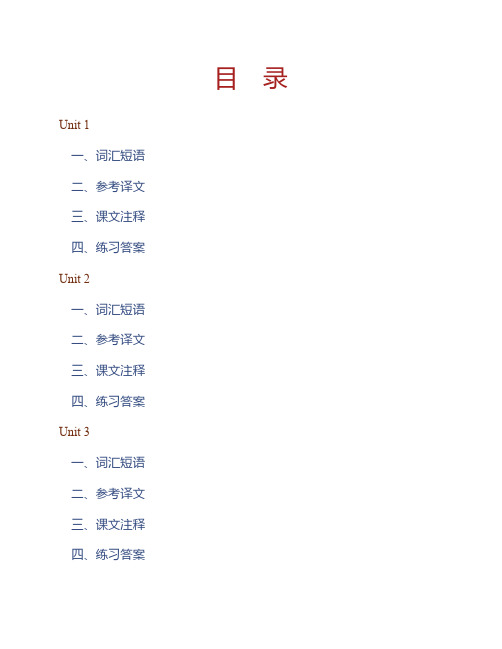
35. bitterly [5bitEli] adj. very; violently 强烈地;非常 bitterly upset 极其难 过
20. marital [5mAritl] adj. of a husband or wife; of marriage夫妇间的;婚姻 的
21. spot [spCt] v. pick out(one person or thing from many); catch sight of; recognize; discover辨出;认出;发觉;e.g. Vicenzo failed to spot the error. 维森佐没能发现这个错误。 n. 地点;斑点 on the spot 立刻,当 场;在危险中;处于负责地位 vt. 弄脏;e.g. His boots were spotted with mud. 他的靴子上沾有泥渍。
2. curious [5kjuEriEs] adj. eager to know r learn富于好奇心的,有求知欲 的,感兴趣的
3. fastidious [fAs5tidiEs] adj. selecting carefully; choosing only what is good挑剔的;苛求的,难取悦的;e.g. She is too fastidious about her food or clothing. 她爱讲究吃穿。
38. stiffly [5stifli] adj. stubbornly, obstinately 生硬地;顽固地;呆板地e.g. They greeted each other stiffly, without affection. 他们生硬地打着招呼,没 有一丝爱意。
新编英语教程6课文翻译
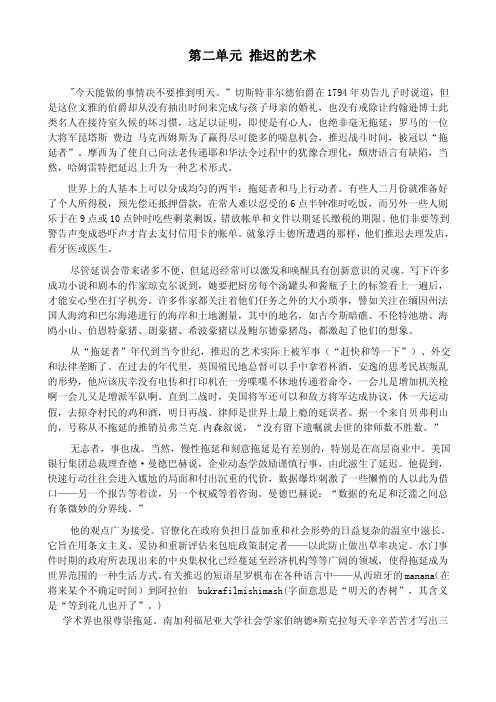
第二单元推迟的艺术"今天能做的事情决不要推到明天。
”切斯特菲尔德伯爵在1794年劝告儿子时说道,但是这位文雅的伯爵却从没有抽出时间来完成与孩子母亲的婚礼,也没有戒除让约翰逊博士此类名人在接待室久候的坏习惯,这足以证明,即使是有心人,也绝非毫无拖延,罗马的一位大将军昆塔斯费边马克西姆斯为了赢得尽可能多的喘息机会,推迟战斗时间,被冠以“拖延者”。
摩西为了使自己向法老传递耶和华法令过程中的犹豫合理化,颓唐语言有缺陷,当然,哈姆雷特把延迟上升为一种艺术形式。
世界上的人基本上可以分成均匀的两半:拖延者和马上行动者。
有些人二月份就准备好了个人所得税,预先偿还抵押借款,在常人难以忍受的6点半钟准时吃饭,而另外一些人则乐于在9点或10点钟时吃些剩菜剩饭,错放帐单和文件以期延长缴税的期限。
他们非要等到警告声变成恐吓声才肯去支付信用卡的帐单。
就象浮士德所遭遇的那样,他们推迟去理发店,看牙医或医生。
尽管延误会带来诸多不便,但延迟经常可以激发和唤醒具有创新意识的灵魂。
写下许多成功小说和剧本的作家琼克尔说到,她要把厨房每个汤罐头和酱瓶子上的标签看上一遍后,才能安心坐在打字机旁。
许多作家都关注着他们任务之外的大小琐事,譬如关注在缅因州法国人海湾和巴尔海港进行的海岸和土地测量,其中的地名,如古今斯暗礁、不伦特池塘、海鸥小山、伯恩特豪猪、朗豪猪、希波豪猪以及鲍尔德豪猪岛,都激起了他们的想象。
从“拖延者”年代到当今世纪,推迟的艺术实际上被军事(“赶快和等一下”)、外交和法律垄断了。
在过去的年代里,英国殖民地总督可以手中拿着杯酒,安逸的思考民族叛乱的形势,他应该庆幸没有电传和打印机在一旁喋喋不休地传递着命令,一会儿是增加机关枪啊一会儿又是增派军队啊。
直到二战时,美国将军还可以和敌方将军达成协议,休一天运动假,去掠夺村民的鸡和酒,明日再战。
律师是世界上最上瘾的延误者。
据一个来自贝弗利山的,号称从不拖延的推销员弗兰克.内森叙说,“没有留下遗嘱就去世的律师数不胜数。
新编大学英语综合教程Unit6-A-课文翻译

新编大学英语综合教程Unit 6课文翻译Passage ABefore You ReadWhat do you think of the importance of making friends in daily life?你认为在日常生活中交朋友的重要性是什么?Friends and Friendship朋友和友情There is a famous line- No man is an island from John Donne's Devotion, written more than three hundred years ago. Even now almost everyone doesn't agree him more. No one could lead an ordinary life without friends. Otherwise, our life would be“boring”“dead", and even“out”. Especially in trouble, just like an old saying goes: a friend in need is a friend indeed. We need friends to pour out, communicate, help, support, and encourage. On the contrary, we also need friends to share our joys. But for some of us, it is not easy to make friend.有一句名言——没有人可以成为一座孤岛,这是约翰·唐恩写于三百多年前的关照。
即使现在,几乎每个人都不同意他。
没有朋友,没有人能过上平凡的生活。
否则,我们的生活会“无聊”“死亡”,甚至“出局”。
新编英语教程6的2、3、6、7、8、9、11课课文翻译

第二单元推迟的艺术"今天能做的事情决不要推到明天。
”切斯特菲尔德伯爵在1794年劝告儿子时说道,但是这位文雅的伯爵却从没有抽出时间来完成与孩子母亲的婚礼,也没有戒除让约翰逊博士此类名人在接待室久候的坏习惯,这足以证明,即使是有心人,也绝非毫无拖延,罗马的一位大将军昆塔斯费边马克西姆斯为了赢得尽可能多的喘息机会,推迟战斗时间,被冠以“拖延者”。
摩西为了使自己向法老传递耶和华法令过程中的犹豫合理化,颓唐语言有缺陷,当然,哈姆雷特把延迟上升为一种艺术形式。
世界上的人基本上可以分成均匀的两半:拖延者和马上行动者。
有些人二月份就准备好了个人所得税,预先偿还抵押借款,在常人难以忍受的6点半钟准时吃饭,而另外一些人则乐于在9点或10点钟时吃些剩菜剩饭,错放帐单和文件以期延长缴税的期限。
他们非要等到警告声变成恐吓声才肯去支付信用卡的帐单。
就象浮士德所遭遇的那样,他们推迟去理发店,看牙医或医生。
尽管延误会带来诸多不便,但延迟经常可以激发和唤醒具有创新意识的灵魂。
写下多成功小说和剧本的作家琼克尔说到,她要把厨房每个汤罐头和酱瓶子上的标签看上一遍后,才能安心坐在打字机旁。
多作家都关注着他们任务之外的大小琐事,譬如关注在缅因州法国人海湾和巴尔海港进行的海岸和土地测量,其中的地名,如古今斯暗礁、不伦特池塘、海鸥小山、伯恩特豪猪、朗豪猪、希波豪猪以及鲍尔德豪猪岛,都激起了他们的想象。
从“拖延者”年代到当今世纪,推迟的艺术实际上被军事(“赶快和等一下”)、外交和法律垄断了。
在过去的年代里,英国殖民地总督可以手中拿着杯酒,安逸的思考民族叛乱的形势,他应该庆幸没有电传和打印机在一旁喋喋不休地传递着命令,一会儿是增加机关枪啊一会儿又是增派军队啊。
直到二战时,美国将军还可以和敌将军达成协议,休一天运动假,去掠夺村民的鸡和酒,明日再战。
律师是世界上最上瘾的延误者。
据一个来自贝弗利山的,号称从不拖延的推销员弗兰克.森叙说,“没有留下遗嘱就去世的律师数不胜数。
Unit6Food新编大学英语第二版第二册课文翻译.pdf

Unit 6 FoodFood and Culture[1] We all have ideas about what kinds of foods are good to eat. We also have ideasabout what kinds of foods are bad to eat. As a result, people from one culture often thinkthe foods that people from another culture eat are disgusting or nauseating. When the famous boxer Muhammad Ali visited Africa, for example, one member of his group became quite sick when he saw someone pick up a butterfly and eat it. Many people would find it disgusting to eat rats, but there are forty-two different cultures whose people regard rats as appropriate food.[2] Some people in Africa think African termites make a delicious meal. Many otherpeople would probably be sick if they had to eat termites, but one hundred grams of termites contain more than twice as many calories and almost twice as much protein asone hundred grams of cooked hamburger.[3] However, food likes and dislikes do not always seem related to nutrition. For example, broccoli is first on a list of the most nutritious common vegetables, but it is twenty-first on a list of vegetables that Americans like most to eat. Tomatoes are sixteenth on the list of most nutritious vegetables, but they are first on the list of vegetables that Americans like most to eat.[4] But dislike is not the only reason why some cultures will not eat a certain food. Insome cultures, certain foods are taboo. Taboo is a word from the language of the Fiji Islands that is used to describe something that is forbidden. Some foods are taboo in certain religions, but there are also other food taboos that are not connected to a religion.We do not usually think about why certain things are taboo in our culture. We may noteven know why they are taboo. Anthropologists try to discover the hidden reasons for taboos. For example, the sacred cows of India are well known. Cows can go wherever theywant to in the streets of India, and they can eat anything they want from the supplies ofthe foodsellers on the street. As a result, the cows are a problem. However, no one in India will kill them or eat them. It is taboo to do so. This custom seems strange to otherpeople, but anthropologists believe that there are reasons for it. First, cows are valuablebecause the farmers need them to help plow their fields. Second, cow manure is used as afertilizer on the fields. In India, many farmers cannot afford to spend money on fertilizer.Third, the cow manure can be dried and burned to make cooking fires. Therefore, farmersthat kill their cows for meat soon find that they cannot plow or fertilize their fields or make a cooking fire.[5] Another example is that Americans do not eat dogs, although people from someother cultures regard them as good food. In the United States, dogs are very important topeople as pets. They are usually regarded as part of the family, almost like a child in somecases. In addition, dogs have value as protection against criminals. Thieves will not usually enter a house where there is a dog because the dog will bark and possibly attack astranger who is trying to get into a house. Apparently, the dog's place in society as a companion and as protection against criminals makes the dog taboo as food.[6] The taboo against eating pork occurs in more than one culture. There is some evidence that some ancient Egyptians did not eat pork. The ancient Israelites also regarded pork as taboo. One explanation for the pig-eating taboo is that pork that is notcooked sufficiently may spread a disease called trichinosis. However, most people no longer think that this is a good explanation for the pork taboo. Another explanation is that the Israelites were nomads—they were always moving from place to place. People have to stay in one place to raise pigs. The Israelites did not want to stay in one place because they did not want to change their culture. As a result, they did not eat pigs.[7] Anthropologists believe that most food likes and dislikes are a result of the waysof life of different people. Some people live in areas where there are both large animalsand many insects. It is difficult for these people to kill large animals, and it requires a lotof energy. It is easier for them to use insects for food because it is not difficult to catchinsects and it does not require a lot of energy. Nomadic people who move around will notwant to keep pigs for food. People will not eat pets such as dogs. Americans eat a lot ofbeef because there is plenty of land for raising cattle and their meat can be shipped cheaply for long distances by railroads.饮食与文化1 对于什么样的食物好吃,我们都有自己的主见。
新编英语教程book6unit8appetite英汉对照
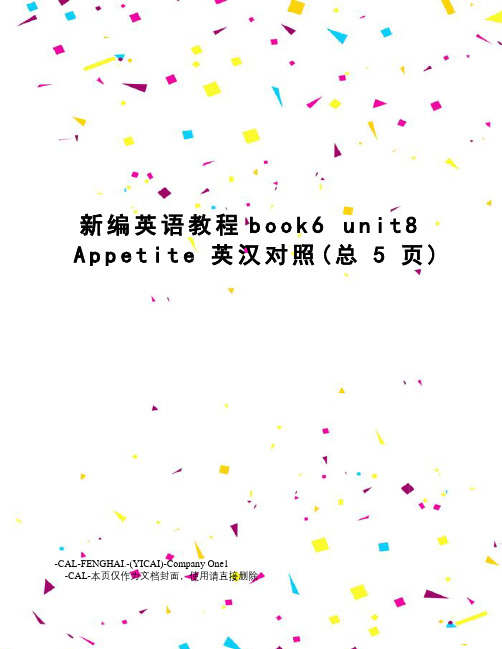
新编英语教程b o o k6u n i t8 A p p e t i t e英汉对照(总5页)-CAL-FENGHAI.-(YICAI)-Company One1-CAL-本页仅作为文档封面,使用请直接删除: very numerous, various;:strong desire;violent desire to possess sth;欲望: wild festivity;wild parties纵欲欢饮: quality特性; feel触觉,appearance of a substance;:force somebody into (doing sth); beat;:;repletion;satiety,the state of being satisfactorily full ,a large, usually lavish, meal;: pleasure;greatsatisfaction;gratification of one’s desire ;: honor or respect for; high regard for;: stuff/fill oneself completely with food;饕餮: powerlessness;paralysis:to get weakened ,becomeweakerAppetite(渴望)(Laurie Lee)(萝莉·里)One of the major pleasures in life is appetite, and one of our major duties should be to preserve it. 渴望乃生活之一大乐事,而心怀渴望则成为一项重要的任务。
Appetite is the keenness of living; it is one of the senses that tells you that you are still curious to exist,that you still have an edge on your longings and want to bite into the world and taste its multitudinous flavors and juices.渴望意味着对生活充满热情,这种感觉表明你依然希冀生活,热衷梦想,向往探索世界,历尽世间百味百态。
新编英语教程6 unit10 12 13 译文

新编英语教程6第10单元译文全A 文盲1尽管我们学校为数众多的普通文盲目前得到极大的关注,但是,我们却忽略了另一类文盲,这类文盲的困境,在从很多方面来讲,更加事关重大,因为他们更具有影响力。
这类文盲通常是一位大学的校长,但他也是位典型的博士、成功的教授和教科书作者。
我把这个人称为全A文盲,蔚蓝给予全A文盲和普通文盲一样的关注,才有了下文。
2以下的场景是我的办公室,我正在工作,做着协助治疗全A文盲(多年来我一直这样称呼这种病症)所必须做的事。
我对一篇学生论文进行询问。
查证,深入探求他的含义。
这是位平均成绩全A的大四学生,聪明绝顶、口齿伶俐,刚获得一所全国重点研究生院提供的令人羡慕的奖学金。
他和我一直在一句一句地、一字一字地分析这论文,已经进行了一个小时。
“有关多种共线外因变量的选择”,我默念着他的论文,“视某些多种相互关联的共同作用系数的衍生情况而定”。
我停下来喘了口气。
“那么看看这句话,”我询问这个学生(我讽喻寓言式地称呼他为聪明先生),“这句话,聪明先生,究竟是什么意思啊?”聪明先生锁眉苦思。
最终,结合了我们的语言学知识和想象力,又用了好像一个小时似的,终于破译了这句话。
我们搞清楚了聪明先生究竟试图表达的是什么,他真正想说的是什么,那就是:“供给决定需求”。
3在过去的大约十年间,我认识了许多像他这样的学生,许多大四学生都患上了这种聪明病。
侵袭了最优秀的心灵,逐渐摧毁批判的能力,使得他们丧失了发现自己或别人文章中那些莫名其妙、毫无意义的话的本领。
在高等教育期间,这种病更加恶化,特别是一般在受害者拿到博士学位的时候,进入晚期、显然,聪明病的受害者不是普通的文盲病。
他提交的论文里从来不会有拼写错误或标点错误;他从不使用双重否定或“irregardless”这样的词语(译者按:无论在标准或非标准变化体中都没有这个词真正的前身。
该词可能把“irrespective”和“regardless”合在一起生造出来的。
新编英语教程6文本第一课
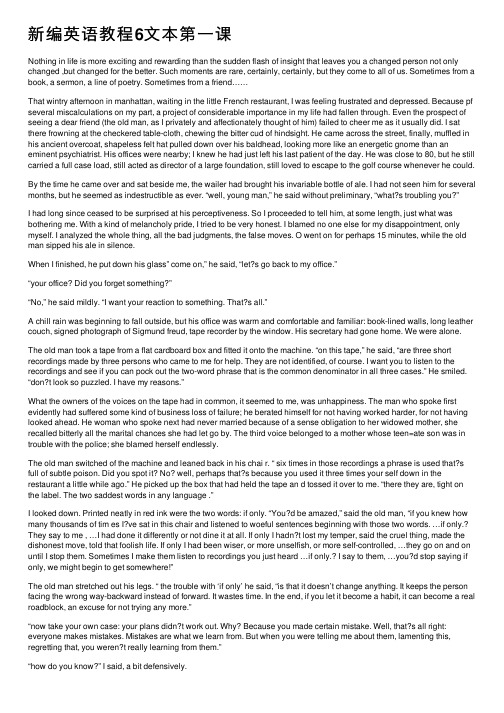
新编英语教程6⽂本第⼀课Nothing in life is more exciting and rewarding than the sudden flash of insight that leaves you a changed person not only changed ,but changed for the better. Such moments are rare, certainly, certainly, but they come to all of us. Sometimes from a book, a sermon, a line of poetry. Sometimes from a friend……That wintry afternoon in manhattan, waiting in the little French restaurant, I was feeling frustrated and depressed. Because pf several miscalculations on my part, a project of considerable importance in my life had fallen through. Even the prospect of seeing a dear friend (the old man, as I privately and affectionately thought of him) failed to cheer me as it usually did. I sat there frowning at the checkered table-cloth, chewing the bitter cud of hindsight. He came across the street, finally, muffled in his ancient overcoat, shapeless felt hat pulled down over his baldhead, looking more like an energetic gnome than an eminent psychiatrist. His offices were nearby; I knew he had just left his last patient of the day. He was close to 80, but he still carried a full case load, still acted as director of a large foundation, still loved to escape to the golf course whenever he could. By the time he came over and sat beside me, the wailer had brought his invariable bottle of ale. I had not seen him for several months, but he seemed as indestructible as ever. “well, young man,” he said without preliminary, “what?s troubling you?”I had long since ceased to be surprised at his perceptiveness. So I proceeded to tell him, at some length, just what was bothering me. With a kind of melancholy pride, I tried to be very honest. I blamed no one else for my disappointment, only myself. I analyzed the whole thing, all the bad judgments, the false moves. O went on for perhaps 15 minutes, while the old man sipped his ale in silence.When I finished, he put down his glass” come on,” he said, “let?s go back to my office.”“your office? Did you forget something?”“No,” he said mildly. “I want your reaction to something. That?s all.”A chill rain was beginning to fall outside, but his office was warm and comfortable and familiar: book-lined walls, long leather couch, signed photograph of Sigmund freud, tape recorder by the window. His secretary had gone home. We were alone. The old man took a tape from a flat cardboard box and fitted it onto the machine. “on this tape,” he said, “are three short recordings made by three persons who came to me for help. They are not identified, of course. I want you to listen to the recordings and see if you can pock out the two-word phrase that is the common denominator in all three cases.” He smiled.“don?t look so puzzled. I have my reasons.”What the owners of the voices on the tape had in common, it seemed to me, was unhappiness. The man who spoke first evidently had suffered some kind of business loss of failure; he berated himself for not having worked harder, for not having looked ahead. He woman who spoke next had never married because of a sense obligation to her widowed mother, she recalled bitterly all the marital chances she had let go by. The third voice belonged to a mother whose teen=ate son was in trouble with the police; she blamed herself endlessly.The old man switched of the machine and leaned back in his chai r. “ six times in those recordings a phrase is used that?s full of subtle poison. Did you spot it? No? well, perhaps that?s because you used it three times your self down in the restaurant a little while ago.” He picked up the box that had held the tape an d tossed it over to me. “there they are, tight on the label. The two saddest words in any language .”I looked down. Printed neatly in red ink were the two words: if only. “You?d be amazed,” said the old man, “if you knew how many thousands of tim es I?ve sat in this chair and listened to woeful sentences beginning with those two words. …if only.? They say to me , …I had done it differently or not dine it at all. If only I hadn?t lost my temper, said the cruel thing, made the dishonest move, told that foolish life. If only I had been wiser, or more unselfish, or more self-controlled, …they go on and on until I stop them. Sometimes I make them listen to recordings you just heard …if only.? I say to them, …you?d stop saying if only, we might begin to get somewhere!”The old man stretched out his legs. “ the trouble with ‘if only’ he said, “is that it doesn’t change anything. It keeps the person facing the wrong way-backward instead of forward. It wastes time. In the end, if you let it become a habit, it can become a real roadblock, an excuse for not trying any more.”“now take your own case: your plans didn?t work out. Why? Because you made certain mistake. Well, that?s all right: everyone makes mistakes. Mistakes are what we learn from. But when you were telling me about them, lamenting this, regretting that, you weren?t really learning from them.”“how do you know?” I said, a bit defensively.“because.” Said the old man, “you never got out of the past tense. Not only did you mention the future. And in a way –be honest. Now! you were enjoying it. There?s a perverse streak in all of us that makes us like to hash over old mistakes. After all, when you relate the story of some disaster or disappointment that has happened to you, you?re still the c hief character, still in the center of the stage.”I shook my head ruefully. “well, what?s the remedy?”“shift the focus,” said the old man promptly.” Change the key words and substitute a phrase that supplies lift instead of creating drag.”“ do you have such a phrase to recommend?”“certainly. Strike out the words? if only? substitute the phrase? next time.?” “that?s right. I?ve seen it work minor miracles right here in this room. As long as a patient keeps saying? if only,? to me , he's in trou ble,. But when he looks me in the eye and says? …next time.? I know he?s on is way to overcoming his problem. It means he has decided to apply the lessons he has learned form his experience, however grim or painful it may have been. It means he?s going to push aside the roadblock of regret, move forward, take action, resume living. Try it yourself. You?ll see.”My old friend stopped speaking outside, I could hear the rain whispering against the windowpane. I tried sliding one phrase out of my mind and replacing it with the other. It was fanciful, of course, but course, but I could hear the new words lock into place with an audible click……The Old Man stood up a bit stiffly. “well, class dismissed. It has been good to see you, young man. Always is. Now, if you will help me find a taxi, I probably should be getting on home. “We came out of the building into the rainy night. I spotted a crushing cab and ran toward it, but another pedestrian was quicker.“My, my,” said the Old Man slyly. “If only we had come down ten seconds sooner, we?d have caught that cab, wouldn?t we?”L laughed and picked up the cue. “Next time I?ll run faster.”“That?s it,” cried the Old Man, pulling his absurd hat down around his ears. “That?s it exactly!”Another taxi slowed. I opened the door for him. He smiled and waved as it moved away. I never saw him again. A month later, he died of a sudden heart attack, in full stride, so to speak.More than a year has passed since that rainy afternoon in Manhattan. But to this day, whenever I find my self thinking “if only”, I change it to “next time”. Then I wait for that amost-peceptible mental click. And when I hear it, I think of the Old Man.A small fragment of immortality, to be sure. But its? the kind he would have wanted.。
新编英语教程6课本译文

新编英语教程6课本译文第1单元避免两词铭记两词在生活中,没有什么比顿悟更令人激动和兴奋的,它可以改变一个人——不仅仅是改变,而且变得更好。
当然,这种顿悟是很罕见的,但仍然可以发生在我们所有人身上。
它有时来自一本书,一个说教或一行诗歌,有时也来自一个朋友。
在曼哈顿一个寒冷的冬天的下午,我坐在一个法国小餐馆,倍感失落和压抑。
因为几次误算,在我生命中一个至关重要的项目就这样落空了。
就因为这样,甚至连期望看到一个老朋友(我常常私下亲切的想到的一个老人)的情形都不像以前那样令我兴奋。
我坐在桌边,皱起眉头看着色彩多样的桌布,清醒的嚼着苦涩的食物。
他穿过街道,裹着旧棉袄,一顶帽子从光头打下来,看上去不像是一个有名的精神病医生,倒像是一个精力充沛的侏儒。
他的办公室在附近到处都有,我知道他刚刚离开他最后一个病人。
他接近80岁,但仍然扛着一个装着满满文件的公文包,工作起来仍然像一个大公司的主管,无论何时有空,他都仍然爱去高尔夫球场。
当他走过来坐我旁边时,服务员早已把他总是要喝的啤酒端了过来,我已经几个月没有见他了,但他似乎还是老样子。
没有任何寒暄,他就问我“怎么了,年轻人?”我已经不再对他的样子感到奇怪,所以我详细地把烦恼告诉他。
带着一丝忧伤的自豪。
我尽量说出实情,除了我自己,我并没有因为失望而责备任何人。
我分析了整件事情,但所有负面评价以及错误仍然继续。
我讲了约有十五分钟,这期间老人只是默默的喝着啤酒。
我讲完后,他取下眼镜说:“到我的办公室去。
”“到你的办公室?你忘了带什么了吗?”他和蔼的说“不是,我想看看你对某些事情的反应,仅此而已。
”外面开始下起小雨,但他的办公室很温暖,舒服,亲切:放满书的书架靠着墙壁,长皮沙发,弗洛伊德的亲笔签名照,还有墙边放着的录音笔。
他的秘书回家了,只有我们在那里。
老人从纸盒里拿出一盘磁带放进录音笔,然后说:“这里有到我这来求助的三个人的简单录音,当然,这没有说明具体是哪三个人。
我想让你听听,看你是否能找出双字词的短语,这里是在三个案例中共有的。
新编英语教程6ACrimeofCompassion
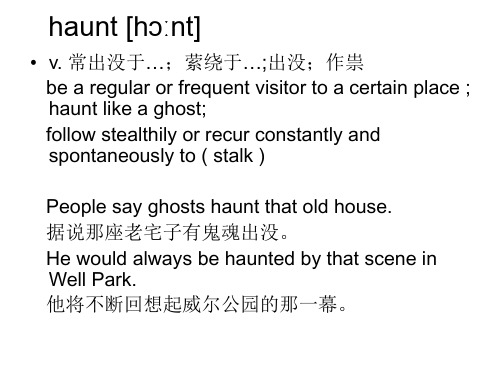
13 他那绝望的眼神和声音让我充满了内疚, “我会停下的”,当要注射止痛剂时我告 诉他。
14 我坐在病床上握着麦克的手。他用他 那枯瘦如柴的指头压了压我的手,喃喃道, 谢谢。然后耳边传来一声轻轻的叹息,我 感觉到被我握着的手在渐渐变凉。“麦克?” 我低语道,我在等着他的胸膛再次起伏。
mumble murmur mutter [语言学]弱元音;低语元音 /~vowel [医药科学 ] (心脏等的)杂音 /heart ~ mumble ['mʌmb(ə)l] vt. 含糊地说;抿着嘴嚼 vi. 含糊地说话 n. 含糊的话;咕噜 He could hear the low mumble of Navarro‘s voice.他能听到纳瓦罗的低声咕哝。 Her grandmother mumbled in her sleep. 她祖母睡觉时咕哝了。
mutter ['mʌtə] vi. 咕哝;喃喃自语 vt. 咕哝;抱怨地说;低声含糊地说 n. 咕哝;喃喃低语 They make no more than a mutter of protest. 他们不过是小声抗议了一下。 She can hear the old woman muttering about consideration. 她能听见这老妇人低声说要考虑考虑。
It was snowing when he arrived at the construction site. 他到达工地时,天正在下雪。 He wasng. 他母亲做饭时他在看电视。 You will grow wiser as you grow older. 你会随着年龄的增长而越来越聪明。
His campaign was riddled with accusations and personal attacks . 他的竞选活动充满了指责和人身攻击。 The path to success is one that is going to be riddled with lots of uphills and downhills. 通往成功的路将会是崎岖不平的 Unknown attackers riddled two homes with gunfire. 不明来路的袭击者用枪把两座房屋打得千 疮百孔。
新编英语教程6unit9、10课文翻译
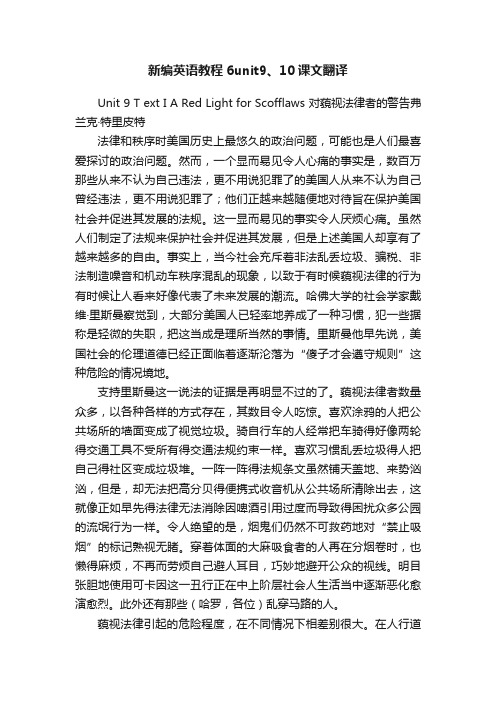
新编英语教程6unit9、10课文翻译Unit 9 T ext I A Red Light for Scofflaws 对藐视法律者的警告弗兰克·特里皮特法律和秩序时美国历史上最悠久的政治问题,可能也是人们最喜爱探讨的政治问题。
然而,一个显而易见令人心痛的事实是,数百万那些从来不认为自己违法,更不用说犯罪了的美国人从来不认为自己曾经违法,更不用说犯罪了;他们正越来越随便地对待旨在保护美国社会并促进其发展的法规。
这一显而易见的事实令人厌烦心痛。
虽然人们制定了法规来保护社会并促进其发展,但是上述美国人却享有了越来越多的自由。
事实上,当今社会充斥着非法乱丢垃圾、骗税、非法制造噪音和机动车秩序混乱的现象,以致于有时候藐视法律的行为有时候让人看来好像代表了未来发展的潮流。
哈佛大学的社会学家戴维·里斯曼察觉到,大部分美国人已轻率地养成了一种习惯,犯一些据称是轻微的失职,把这当成是理所当然的事情。
里斯曼他早先说,美国社会的伦理道德已经正面临着逐渐沦落为“傻子才会遵守规则”这种危险的情况境地。
支持里斯曼这一说法的证据是再明显不过的了。
藐视法律者数量众多,以各种各样的方式存在,其数目令人吃惊。
喜欢涂鸦的人把公共场所的墙面变成了视觉垃圾。
骑自行车的人经常把车骑得好像两轮得交通工具不受所有得交通法规约束一样。
喜欢习惯乱丢垃圾得人把自己得社区变成垃圾堆。
一阵一阵得法规条文虽然铺天盖地、来势汹汹,但是,却无法把高分贝得便携式收音机从公共场所清除出去,这就像正如早先得法律无法消除因啤酒引用过度而导致得困扰众多公园的流氓行为一样。
令人绝望的是,烟鬼们仍然不可救药地对“禁止吸烟”的标记熟视无睹。
穿着体面的大麻吸食者的人再在分烟卷时,也懒得麻烦,不再而劳烦自己避人耳目,巧妙地避开公众的视线。
明目张胆地使用可卡因这一丑行正在中上阶层社会人生活当中逐渐恶化愈演愈烈。
此外还有那些(哈罗,各位)乱穿马路的人。
藐视法律引起的危险程度,在不同情况下相差别很大。
新编英语教程6 U7 beauty中英对照

A beautiful woman, we say in English. But a handsome man. “Handsome” is the masculine equivalent of-and refusal of-a compliment which has accumulate certain demeaning overtones, by being resolved women only. That one can call a man in French and in Italian suggests that catholic countries, unlike those countries shaped by the Protestant version of Christianity, still retain some vestiges of the pagan admiration for beauty. But the differences, if one exists, is of degrees only. In every modern country that is Christian or post-Christian, women are the beautiful sex to the detriment of the notion of beauty as well as of women. To be called beautiful is thought to name something essential to women’s character and concerns. (In contrast to men whose essence is to be strong or competent). It doesn’t take someone in the throes of advanced feminist awareness to perceive that the way women are taught to be involved with beauty encourages narcissism, reinforces dependence and immaturity. Everybody (women and men) knows that. For it is ”every body”, a whole society, that has identified with caring about what one is and does and only secondarily, if at all, about how one looks.) Given these stereotype, it is on wonder that beauty enjoys, at best, a rather mixed reputation.一个美丽的女人,我们在英语中是这么说的。
- 1、下载文档前请自行甄别文档内容的完整性,平台不提供额外的编辑、内容补充、找答案等附加服务。
- 2、"仅部分预览"的文档,不可在线预览部分如存在完整性等问题,可反馈申请退款(可完整预览的文档不适用该条件!)。
- 3、如文档侵犯您的权益,请联系客服反馈,我们会尽快为您处理(人工客服工作时间:9:00-18:30)。
第1单元避免两词铭记两词在生活中,没有什么比顿悟更令人激动和兴奋的,它可以改变一个人——不仅仅是改变,而且变得更好。
当然,这种顿悟是很罕见的,但仍然可以发生在我们所有人身上。
它有时来自一本书,一个说教或一行诗歌,有时也来自一个朋友。
在曼哈顿一个寒冷的冬天的下午,我坐在一个法国小餐馆,倍感失落和压抑。
因为几次误算,在我生命中一个至关重要的项目就这样落空了。
就因为这样,甚至连期望看到一个老朋友(我常常私下亲切的想到的一个老人)的情形都不像以前那样令我兴奋。
我坐在桌边,皱起眉头看着色彩多样的桌布,清醒的嚼着苦涩的食物。
他穿过街道,裹着旧棉袄,一顶帽子从光头打下来,看上去不像是一个有名的精神病医生,倒像是一个精力充沛的侏儒。
他的办公室在附近到处都有,我知道他刚刚离开他最后一个病人。
他接近80岁,但仍然扛着一个装着满满文件的公文包,工作起来仍然像一个大公司的主管,无论何时有空,他都仍然爱去高尔夫球场。
当他走过来坐我旁边时,服务员早已把他总是要喝的啤酒端了过来,我已经几个月没有见他了,但他似乎还是老样子。
没有任何寒暄,他就问我“怎么了,年轻人?”我已经不再对他的样子感到奇怪,所以我详细地把烦恼告诉他。
带着一丝忧伤的自豪。
我尽量说出实情,除了我自己,我并没有因为失望而责备任何人。
我分析了整件事情,但所有负面评价以及错误仍然继续。
我讲了约有十五分钟,这期间老人只是默默的喝着啤酒。
我讲完后,他取下眼镜说:“到我的办公室去。
”“到你的办公室?你忘了带什么了吗?”他和蔼的说“不是,我想看看你对某些事情的反应,仅此而已。
”外面开始下起小雨,但他的办公室很温暖,舒服,亲切:放满书的书架靠着墙壁,长皮沙发,弗洛伊德的亲笔签名照,还有墙边放着的录音笔。
他的秘书回家了,只有我们在那里。
老人从纸盒里拿出一盘磁带放进录音笔,然后说:“这里有到我这来求助的三个人的简单录音,当然,这没有说明具体是哪三个人。
我想让你听听,看你是否能找出双字词的短语,这里是在三个案例中共有的。
”他笑道:“不要这么困扰,我有我的目的。
”对我来说,录音中三个主人共有的东西不是什么快乐的东西。
首先讲话的是一个男人,他在生意中经历了一些损失或失败,他指责自己没有辛勤工作,也没有远见。
接下来说话的是一个女人,她还没有结婚,因为对她寡妇母亲的强烈的责任意思,她伤心的回忆了所有擦肩而过的婚姻机遇。
第三个说话的是一位母亲,她十多岁的儿子在警察局有麻烦,她总是不停地责备自己。
老人关掉收音机,侧身坐到椅子上:“在这些录音中,有一个短语像病毒一样的出现了六次。
你注意到了吗?没有?噢,这可能是因为几分钟前你在餐馆说过了三次。
”他拿起磁带盒扔给我。
“正好在标签上有那两个伤心的词语。
”我向下一看,那里有两个清晰的红色的印字:如果。
“你受惊了吗?”老人说:“你能想象我坐在这把椅子上以这两个词开头的话有多少次了吗?他们总是对我说:如果换一种方法做——或根本不去做。
(如果我没发脾气、没有做那虚伪的事、没有说那愚蠢的谎言。
如果我聪明点,或更无私点,或更自控点。
)直到我打断说话他们才会停止。
有时我让他们听你刚说过的录音。
我对他们说(如果你停止说如果,我们就已取得进展了。
)”老人伸出双脚,说:“问题是,‘如果’并没有改变任何东西。
它使那人面对错误——后退而非前进,那样只是在浪费时间。
最后,要是你让它成为一个习惯,它就会变成真的障碍,变成你不再去做尝试的借口了。
”“现在回到你的情况:你的计划没成功,为什么?因为你犯了某种错误。
唔,这个没关系,毕竟错误谁都会犯,我们也从中学到东西。
但是,当你告诉我那些东西时却悔恨这个,后悔那个的时候,你还没有从错误中学到什么。
”“你怎么知道呢?”我用一种辩驳的语气问道。
“因为你还没有从过去中走出来。
你根本没提及到未来。
在某种程度上——老实说,——现在你仍沉溺于过去。
我们每个人心目中都有一个根深蒂固的不合理的想法——我们会犯一些常犯的的错误却又认为理所当然。
毕竟当你提到受过的灾难和挫折时,你仍然是主角和焦点。
”我悲伤地摇了摇头,说:“嗯,那还有什么能补救的吗?”“有,转移焦点,”老人马上答道,“更换关键字,用一个赋予动力,而不是拖后腿的词来替换它。
”“那你能推荐这样的词给我吗?”“当然可以,去掉‘如果’,换上‘下次’。
”“下次?”“对,我已经在这房间里见识过它产生的奇迹。
只要一个病人不断对我说‘如果’,他就麻烦了。
但是假如他注视着我说‘下次’的话,我知道他就快度过难关了。
这意味着他已经运用从经历中吸取的教训,不论曾经多残酷或痛苦;也意味着他开始推开悔恨的阻碍继续前进,采取行动重新生活。
你尝试看看你也会明白的。
”我的老朋友停止了话题。
我能听到外面雨点正溅落在窗户玻璃上。
我尝试着从大脑中挤出另一个词来替代它。
当然,这只是想象,但我感觉到新词毫无疑问地嵌入了我的脑海…老人略显僵硬地站起来,说:“噢,下课了!我真的很高兴能与你见面,年轻人,一直都是!你能帮我拦辆出租车吗?我也该回家了。
”我们从大楼出来,走进雨夜里,我发现了一辆空车,开始另一个路人却比我快更快。
“哎呀,如果我们早下来十秒钟的话,我们就拦到那辆车了!”,老人狡猾地说。
得到暗示的我笑着说:“下次我一定跑快一点。
”“这就对了,就是这样!”老人说着,顺手把那引人发笑的帽子拉下来围着他的耳朵。
有一辆车缓缓驶来,我为老人打开车门。
他笑着,挥手走了,我再也没有见过他。
一个月之后,他因为心脏病突发而辞世了,可以说是很安详地死去。
那个曼哈顿雨天已过去一年多了。
然而,时至今日,每当我脑海浮现‘如果’这个词时,我马上以‘下次’取而代之。
然后,我等待着那几乎感受到的“嘀嗒”声的响起。
当听到它时,我又想起那位慈祥的老人。
尽管只是永恒中的一个小小片段,但这就是他所想要的。
第七单元美对于古希腊人来说,美丽是一种美德:一种出色表现。
这样的人在今天会理所当然而又无不受嫉妒地被人们称为"完整"的人。
即使古希腊人真的曾经将一个个体的"内在"与"外在"区分开来,他们依然会期望这个个体的内在美能够与他其他方面的美相匹配。
当那些出身良好的年轻雅典人聚集在苏格拉底周围时,他们发现了一个非常矛盾的事实:他们的英雄是如此地睿智,如此英勇,如此高贵,如此有诱惑力——而且,如此其貌不扬。
苏格拉底用自己的丑陋给他的那些天真无邪的,无疑也是非常俊美的始徒们上的其中最重要的一节课就是:生活中充满了矛盾。
他们也许听不进去导师的教诲。
但是我们不会。
几千年以后的今天,我们变的更加小心翼翼地对待美丽之销魂。
我们不但十分轻而易举地把二者——"内在"(品质,智慧)与"外在"(外表)分割开,实际上,当我们看到一个人既漂亮同时又聪明,有才干,善良的时候,我们会感到很惊讶。
人们将美丽从古典的人类理想的中心地位中分裂出来,主要是受到了基督教的影响。
为了将出色(在拉丁文中是virtus,与美德的virtue同源)的范围缩小到仅仅是道德上的出色,基督教将美丽流放了——使它成为一种疏远的,恣意的,肤浅的诱惑。
而美丽的威望不断地流失。
在长达近两个世纪中,美丽约定俗成地变得只能用于形容两性中其中一性:即无论多么"公平对待",依然是排在"第二位"的那一性。
把美丽与女人联系起来使美丽陷入道德上愈加不利的境地。
一个美丽的女人,我们在英语中是这么说的。
但是,我们会说一个英俊的男人。
英俊是美丽的阳性的对等物,同时也是一种藐视。
美丽一词现在专用于女人,它当中积聚着一定的贬抑的弦外之音。
在法语和意大利语中,仍有称一个男性"美丽"的现象,这说明与那些被新教的基督教教义塑造的国家不同,天主教国家中还残存着一些对美丽的异端赞美的痕迹。
但是如果真的有什么区别的话,那只是程度上的。
在所有现代国家中,无论是基督教国家还是后基督教国家,女性都是"美丽的性别"——这是对美丽本身同时也是对女性本身的贬损。
渴望被称为美丽被认为是道出了女性性格的本质与她们所关心事物的核心。
(与男性形成对比——他们的核心是强壮,高效,强竞争力)不需要具有先进女权主义者的敏锐洞察力,人们也能够察觉到,女性被引导向美丽的过程实质上鼓吹了自恋主义,加重了女性的依赖性和不成熟性。
每个人(男人和女人)都心照不宣。
"每一个个体",也就全社会,都默认了"女性化"就是关心一个人看上去怎样,(与男性化的关心一个人是怎样,干得怎样,然后才有可能再关心一个人长得怎样形成了对比)考虑到这些思维定势,无怪乎美丽一词,最多只能享有一种不纯的名声。
当然,渴望美丽本身并没有错,错就错在当追求美变成了一种义务去完成,或者去尝试。
使女性觉得自己比实际的她,或者说正常成长的她要低一筹,是一种被女性广泛接受的谄媚的性别理想化。
因为追求理想的美在实际操作中已成为一种自我压抑的形式。
女性被引导去把她们身体的各部分拆分开来看待,然后独立地衡量各部分。
胸部,腿,臀部,腰身,颈部,眼睛,鼻子,肤色,头发,等等——每一样都被置于焦急的,难于取悦的,时常是近乎绝望的细察之中。
即使一些过关了,肯定还有不足之处。
不达到完美誓不罢休。
在男性那里,好看是一种整体的感觉,是匆匆一瞥留下的印象。
它不需要提供身体各部位的尺寸来确认,没有人会鼓励一个男性将自己的外表一点一点地拆分。
至于外表完美,被认为是微不足道的——甚至是缺乏阳刚之气的。
实际上,一个男人如果在外表上有一点点瑕疵,或伤痕,反而会被很正面地追捧为理想的美男子。
按照一位自称是Robert Redford 迷的影评人(女性)的说法,恰恰是他脸上那一堆影响肤色的黑痔使Redford免于被认作"只有一张漂亮的脸蛋"。
不妨设想在这样的判断中所暗含的对女性和美丽本身的贬损。
Cocteau 曾说:美丽的特权是无限的。
可以肯定,美丽是一种力量。
它也配称为一种力量。
但是值得悲哀的是,这是一种绝无仅有的只有女性才被怂恿去寻求的力量。
这种力量也常常被认为和男性有关;这不是一种行动力而是一种吸引力。
这是一种否定自身的力量。
因为它不是一个人可以自由选择的,至少,由不得一个女人在未经社会许可的情况下自由选择或放弃。
对于一个女性来说,打扮自己,绝不仅仅是一种愉悦。
同时也是一种职责。
这是她的工作。
如果一个女人做了真正意义上的工作——即使攀升到政界,法律界,医学界,商界,诸如此类领域的领导地位——她仍常常被迫承认她自己依然努力使自己保持吸引力。
但是当她正努力维系两个"公平性别"的其中一性的角色之际,她的客观性,她的专业素质,权威性,思想的周密性,则备受质疑。
如果她们做,会被责难;不做,同样会被指责。
